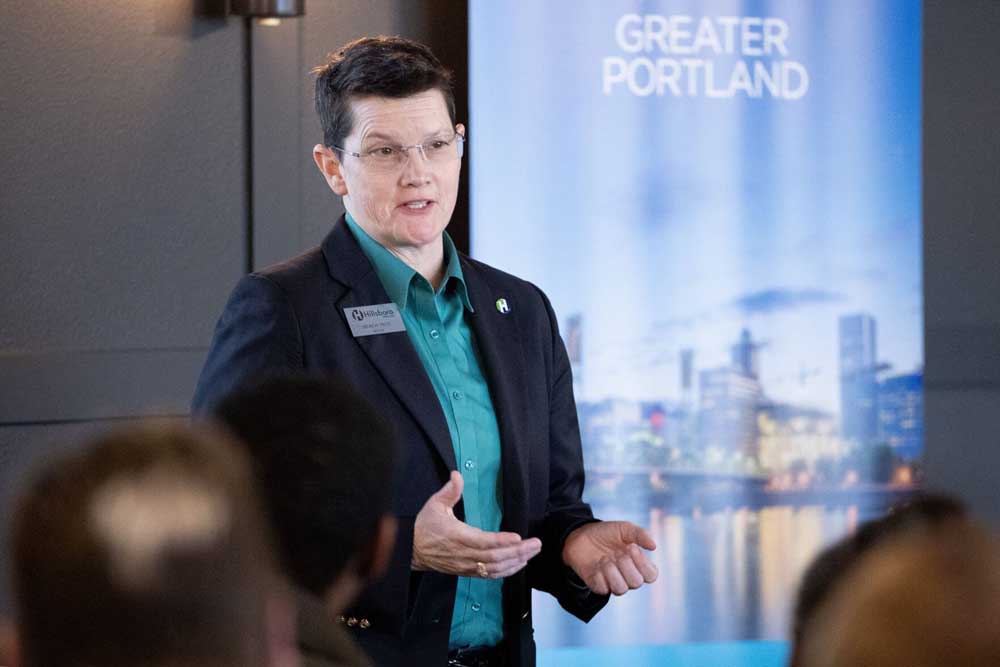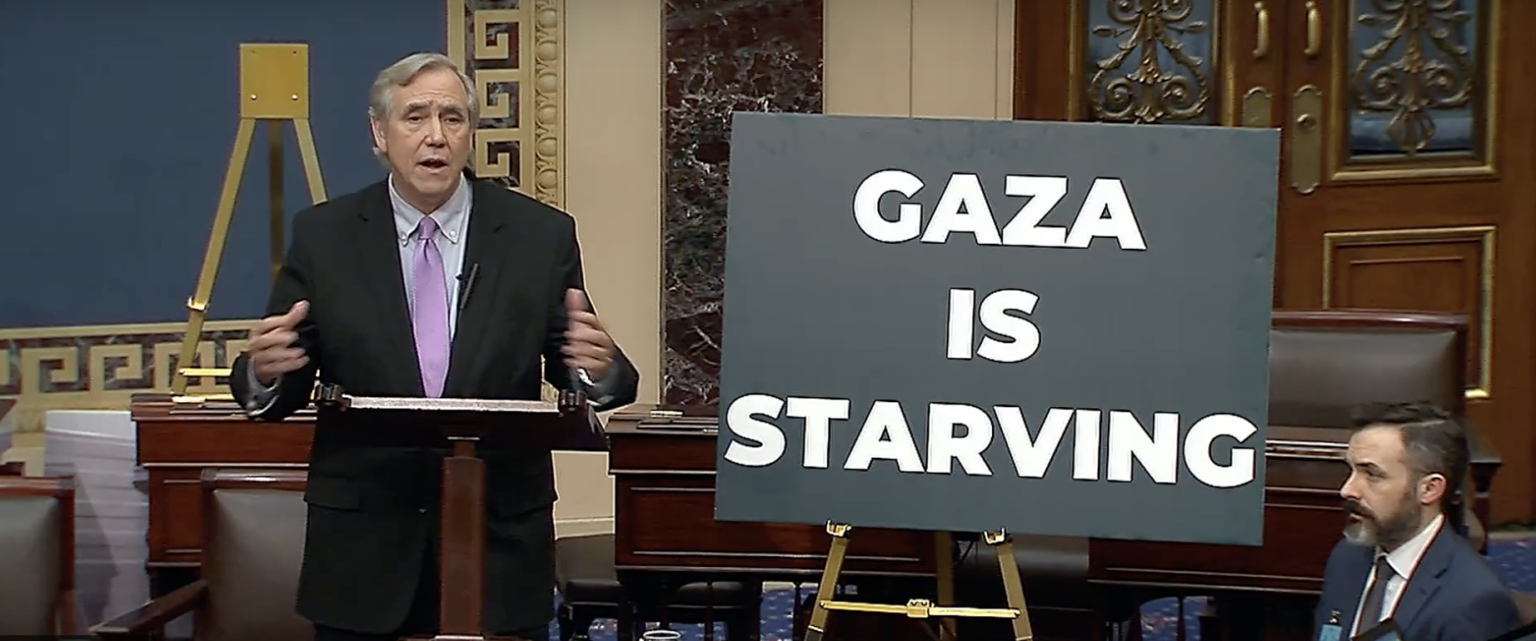Portland Mayor Wilson wants Washington County to fund city’s homeless shelters
Published 5:00 am Saturday, March 22, 2025

- Hillsboro Mayor Beach Pace speaks during the Greater Portland Inc's annual "Meet the Mayors" event March 20, hosted in partnership with the Metropolitan Mayors Consortium at the Brix Tavern in Tualatin.
Addressing the homelessness crisis, the strength of local city economies and how cities are dealing with federal cutbacks were among topics tackled during the annual “Meet the Mayors” event in Washington County.
Trending
Sponsored by Greater Portland Inc., in partnership with the Metropolitan Mayors Consortium, regional leaders shared their thoughts on the state of their cities, and how the state and federal governments play into it.
Beaverton Mayor Lacey Beaty served as master of ceremonies Thursday, March 20, at the tri-county gathering at Tualatin’s Brix Tavern, with much of the discussion revolving around benefits provided to cities using Metro’s supportive housing services bond, a 2020 voter-approved measure to address homelessness and ensuring housing stability.
While Beaverton recently completed its first year-round shelter, Beaty said that libraries in Beaverton have become day shelters.
Trending
“We’ve had to equip and train library staff to deal with an extensive, high-needs homeless population,” Beaty said. “That is not something my librarians were trained to do. We had to bring in a monitor to help have these conversations.”
Still, Beaty said area mayors are responding to homelessness, which she said was the area’s leading problem, and not confined to Portland.
Among the observations on homelessness, affordable housing and economic development, Portland’s mayor — and mayors in Washington County — had these observations:
Portland Mayor Keith Wilson
Wilson said as soon as he began his new job earlier this year, he told area mayors he was looking for regional collaboration. Talking with Oregon Gov. Tina Kotek, Wilson said he learned that 38% of the state’s revenue comes from federal support that trickles down.
“And, of course, I’m trying to shake every tree for money to make sure that we have the funds to set up these nighttime shelters that are so important to rapidly care for our neighbors and so many other things,” he said.
Wilson said in talking to Multnomah County officials and the governor, “we’re asking for support from the state to backfill certain programs (that) we need to get going,” he said.
“And I’ve talked to every county chair. (Washington County Chair Kathryn Harrington), I met with her and asked her for money. It’s very unusual for a mayor of a city to go to a county chair in an adjacent county and say, ‘We’re in trouble…’ But I do know if we don’t ask for help from one another, and we simply try to do it like we’ve known and we’ve always done, we’re not going to support each other in a collaborative fashion to address this humanitarian crisis here on the streets.”
He added that while the federal government plays an important link in everything the city does, “we can’t blame others for what we need to be doing today with the level of suffering that we’re all experiencing.”
Tigard Mayor Heidi Lueb
Lueb said recent figures show that 1,200 people in Washington County have been housed as a result of the Metro measure, which is paid for through personal income tax and a business income tax.
So far, 4,400 people have remained housed through eviction protection rent-assistance programs, and 1,800 people had access to shelters as a result of the Metro funds.
“And what’s even more incredible, is that prior to (the Metro tax), there were no year-round shelter beds in the entire county,” said Lueb. She said those funds, which are administered by Washington County, helped fund the new 60-bed Just Compassion shelter in Tigard.
Currently, there are 400 year-round shelter beds in Washington County, Lueb said.
“Tigard is doing an incredible job in Washington County to help partner with this problem,” Lueb said.
Sherwood Mayor Tim Rosener
Rosener said his city has concerns about the effects of local tariffs.
“We’re seeing capital construction costs for cities going up 7-10% a year, even prior to all this. So, when we’re looking at new projects, that’s a huge concern,” said Rosener.
The mayor also expressed concern about the fate of a $5 million Environmental Protection Agency grant that will be used for cleaning up a so-called “Brownfield” site, in this case a former leather factory where toxic chemicals had been dumped years ago. He said that’s important from an economic development standpoint because plans are to clean up the property and move the city’s public works building to that site.
That move will free up 4.5 acres of property in the city’s downtown core for housing and commercial development.
“We’re very concerned about the chaos that’s happening in D.C. right now. Are we going to get the money? Are we not going to get the money?” he said.
Also of concern is the fate of a $9 million federal grant to expand Sherwood Broadband into into rural areas toward Newberg and including both Parrett Mountain and the Chehalem Mountains areas.
Cornelius Mayor Jef Dalin
The mayor said it took his city almost 20 years to get its library with a 45-unit senior affordable housing upstairs, which proved extremely hard to do. A few years later, the city built 143 units of family housing by going out for a bond.
Since then, the county had come in and developed a homeless transition center, which consists of small huts.
Dalin said he had tried without success before the COVID-19 pandemic to get county permission to put Tough Sheds up at a local church to provide a place for homeless individuals to stay instead of sleeping underneath the bridge linking Cornelius from Hillsboro.
Now the same type of huts are all over town, he said, something that is “far better, far more dignified to give those people somewhere out of the rain than being under a bridge or in a doorway somewhere, right?”
Tualatin Mayor Frank Bubenik
Bubenik highlighted the recent opening of Plambeck Gardens, as an example of successful public housing. The 119-unit facility features of three-bedroom apartments, something rare in the metro region.
“We’ll be doing a ribbon-cutting at the beginning of April, but the first 10 families have moved in,” he said, adding that the city contributed $1 million in federal COVID-19 pandemic money pay for water and sewer to the two buildings at the complex.
Bubenik said on the federal funding level, the city had $16 million in grants thrown into question in three weeks.
“We lost the $15 million 17-city EV (electric vehicle) grant that was gonna have 500 chargers going from Gresham to Portland and Portland down to Salem,” said Bubenik, adding it’s on a 90-day hold. Working with federal representatives, Bubenik said he hopes the grant returns.
At the same time, Bubenik said that the city will now have to find $1 million to fix a leaking roof at the Tualatin Police Department, which previously had that amount of federal dollars attached to replace it.
Hillsboro Mayor Beach Pace
Pace said the Metro funds to address homelessness helped her city as well. That includes Nueva Esperanza, a 150-unit affordable housing development that recently opened in East Hillsboro. Like similar units in Tualatin, Pace said some contain three and four bedrooms for multi-generational living. Another 67 of affordable housing units will go up soon as well.
“Regarding federal dollars, and what it’s doing to us: It’s inhibiting our ability to do transportation projects, which has an impact on us,” she said, adding that’s a personal concern of hers because she was in an accident that left her partially disabled “because of poor traffic planning.”







